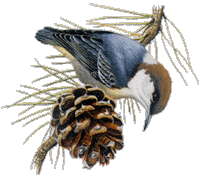Chapel Hill Bird Club—Speakers for 2024–2025
The purpose of the Chapel Hill Bird Club is to provide engagement and educational opportunities for area birders of all experience levels. We offer interesting educational programs, local birding field trips, Christmas and spring bird counts, and connection to other members via a Facebook group. Members have access to like-minded people including experts who can answer your questions. Whether you watch birds in your yard or travel to the ends of the earth to chase rarities, our club offers something for you. We are a friendly group and welcome all to join us, especially new birders! Our members are mostly from the Research Triangle area of North Carolina: Chapel Hill, Durham, Raleigh, Cary, Pittsboro, and surrounding towns.
Visit Our main page
-
March 24, 2025
Bo Howes and Jin Bai—Habitat Management and Bird Population at Brumley North
Brumley Forest Nature Preserve is a local popular birding hotspot in the Triangle, managed by the Triangle Land Conservancy (TLC). TLC has been working on land management activities aimed at improving the quality of habitat at Brumley North, including prescribed burns, removing invasive plants, planting native seeds and plugs, and doing bird-centered outreach events. Since the Fall of 2022, TLC and New Hope Bird Alliance have conducted bird surveys to evaluate the effects of these habitat management activities on the bird population at Brumley N. Bo Howes and Jin Bai will co-present a talk presenting information on the management activities at Brumley N with Jin presenting bird population level and trends at Brumley N using data collected and compiled from the bird survey. In addition, Jin will also talk about the warbler index, which gives some unique insights into the birding hotspots with the highest number of warbler species seen during each migration season in the Triangle.
Bo Howes started as Conservation Project Manager for TLC in October 2008 and currently holds the position of Director of Land Protection and Stewardship West. With deep roots in the local community, Bo has successfully identified, initiated, and closed scores of land projects.
He is a past president of the New Hope Audubon Society and a former member of the Board of Directors of the North Carolina Botanical Garden Foundation. He remains on the Botanical Garden Foundation Conservation Committee and is president of the Chapel Hill Bird Club.
Jin Bai received his Ph.D. in 2024 in the Fisheries, Wildlife, and Conservation Biology program at NCSU and studies the drivers of urban bird diversity. He has extensive experience designing, coordinating, and assisting citizen science projects in the Triangle area, including organizing the Triangle Bird Count and bird-window collision monitoring. Jin is the Community Science Committee Chair and a board member of New Hope Bird Alliance.
-
April 28, 2025
Robert Driver—Evolution and Functional Characterization of Olfactory Receptors in Birds
Vertebrates detect odor molecules with olfactory receptors (ORs), a gene family expressed in the olfactory epithelium. Among species, OR diversity is associated with reliance on smell, with some mammals exceeding 2,000 OR genes. Birds are the most speciose class of terrestrial vertebrates, inhabiting nearly all land environments and with diverse social structures and foraging strategies, yet were long thought to make limited use of olfactory signals. Recent behavioral work in birds has shown important roles for olfaction in foraging and species recognition, among other behaviors. Contributing to this surge of interest in avian olfaction, our recent work has shown that birds have hundreds more OR genes in their genomes than previously realized.
Dr. Driver received his B.S. in Biology from Muhlenberg College in 2009 and his M.S. degree in Biology in 2017 from Villanova University. In 2022, Robert received his PhD in Biology from East Carolina University. Robert is currently an NSF Postdoctoral Research Fellow in Biology in the Department of Molecular Genetics and Microbiology at Duke University, in the lab of Dr. Hiroaki Matsunami, where he researches bird olfactory receptors and bird sense of smell.
-
May 19, 2025
Bradley Scholten—Assessing the spread of antibiotic resistant Salmonella and E. coli in songbirds and at birdfeeders
Bradley will talk about his research which focuses on understanding the spread of antibiotic resistant bacteria in songbirds, specifically looking at Salmonella and E. coli – two pathogens that can cause epidemics in both humans and birds. Currently, he is looking at potential sources for where songbirds acquire these bacteria. Ultimately, he hopes his research will contribute to solutions for limiting the spread of antibiotic resistance and zoonotic diseases.
Bradley is a fifth year PhD student in the Biology program at North Carolina State University, advised by Drs. Roland Kays and Martha Burford Reiskind. He is a 2020 Genetics and Genomics Scholar and a 2024 Global One Health Fellow.
Before starting his PhD, Bradley received his BS in Biology at Calvin University in Grand Rapids, Michigan, where he studied schistosome parasites in common mergansers at inland lakes in Northern Michigan, and also researched how drone flying affects behaviors and stress physiology in tree swallows.
